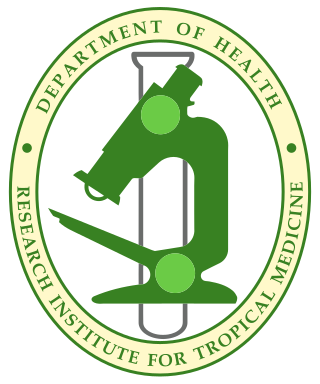Related Research Articles

The National Institutes of Health, commonly referred to as NIH, is the primary agency of the United States government responsible for biomedical and public health research. It was founded in the late 1880s and is now part of the United States Department of Health and Human Services. Many NIH facilities are located in Bethesda, Maryland, and other nearby suburbs of the Washington metropolitan area, with other primary facilities in the Research Triangle Park in North Carolina and smaller satellite facilities located around the United States. The NIH conducts its own scientific research through the NIH Intramural Research Program (IRP) and provides major biomedical research funding to non-NIH research facilities through its Extramural Research Program.
Gopinath Balakrish Nair is an Indian microbiologist known for his work on cholera. At present, he is the Ag. Regional Adviser, Research Policy and Cooperation Unit, Department of Communicable Diseases, World Health Organization. Before joining WHO, he was the executive director of Translational Health Science and Technology Institute (THSTI), Faridabad, NCR, India. Before joining THSTI, he was working in NICED as the director. He has also served as the director of Laboratory Sciences Division at the International Center for Diarrhoeal Diseases Research,, Dhaka, Bangladesh.

The Biocomplexity Institute of Virginia Tech is a research organization specializing in bioinformatics, computational biology, and systems biology. The institute has more than 250 personnel, including over 50 tenured and research faculty. Research at the institute involves collaboration in diverse disciplines such as mathematics, computer science, biology, plant pathology, biochemistry, systems biology, statistics, economics, synthetic biology and medicine. The institute develops -omic and bioinformatic tools and databases that can be applied to the study of human, animal and plant diseases as well as the discovery of new vaccine, drug and diagnostic targets.

The University of Khartoum is a public university located in Khartoum, Sudan. It is the largest and oldest university in Sudan. UofK was founded as Gordon Memorial College in 1902 and established in 1956 when Sudan gained independence. Since that date, the University of Khartoum has been recognized as a top university and a high-ranked academic institution in Sudan and Africa.
Nutritional science is the science that studies the physiological process of nutrition, interpreting the nutrients and other substances in food in relation to maintenance, growth, reproduction, health and disease of an organism.

The Indian Council of Medical Research (ICMR), the apex body in India for the formulation, coordination and promotion of biomedical research, is one of the oldest and largest medical research bodies in the world.

The Yale School of Public Health (YSPH) was founded in 1915 by Charles-Edward Amory Winslow and is one of the oldest public health masters programs in the United States. It is consistently rated among the best schools of public health in the country, receiving recent rankings of 3rd for its doctoral program in epidemiology. YSPH is both a department within the school of medicine as well as an independent, CEPH-certified school of public health.

The Institute of Medical Science is an ancillary establishment of Tokyo University. It succeeded the Institute of Infectious Diseases established in 1892 and is the foremost institute for medical and bioscience research in Japan.

The Research Institute for Tropical Medicine is a health research facility based in Muntinlupa, Philippines.
Expenditures by Canadian universities on scientific research and development accounted for about 40% of all spending on scientific research and development in Canada in 2006.
The Japan Society for the Promotion of Science is an Independent Administrative Institution in Japan, established for the purpose of contributing to the advancement of science in all fields of the natural and social sciences and the humanities.
A facility is a collective term for Japanese organizations such as test and research laboratories, inspection and certification institutes, educational and training facilities, medical and rehabilitation facilities, reformatory and internment facilities, and work facilities that are established under the Cabinet Office or other governmental organizations set forth in Article 3, paragraph 2 of the National Government Organization Act. It is distinguished from an extraordinary organ. The classification was created on 1 July 1985 when an amendment to the National Government Organization Act was put into effect.

The Institute of Environmental Science and Research (ESR) is a New Zealand Crown Research Institute (CRI). Its purpose is to deliver scientific and research services to the public health, food safety, security and justice systems, and the environmental sector to improve the safety of, and contribute to the economic, environmental and social well-being of people and communities in New Zealand.

One Health Trust, formerly the Center for Disease Dynamics, Economics & Policy, is a public health research organization with offices in Washington, D.C., New Delhi, and Bangalore, India.
Translational Health Science and Technology Institute (THSTI) is a society registered under the Societies Registration Act XXI of 1860. It is also an autonomous institute of the Department of Biotechnology, Ministry of Science and Technology, Government of India. It was set up in 2009 at Gurgaon and is now located in NCR Biotech Science Cluster, Faridabad along with the Regional Center for Biotechnology, Advanced Technology Platforms Center, Small Animal Facility, and Bio-incubator. Envisioned by former secretary of DBT, M. K. Bhan, the centre was created to enable faster transition of lab research to market. Pramod Garg is the executive director of THSTI.
Barry R. Bloom is Harvard University Distinguished Service Professor and Joan L. and Julius H. Jacobson Professor of Public Health in the Department of Immunology and Infectious Diseases and Department of Global Health and Population in the Harvard T.H. Chan School of Public Health in Boston, where he served as dean of the faculty from 1998 through December 31, 2008.

Gerald T. Keusch is an American physician-scientist and academic administrator. Keusch is the associate provost for global health at Boston University Medical Campus and a professor of international health and medicine at Boston University School of Public Health. He was the director of John E. Fogarty International Center and the associate director of international research at the National Institutes of Health from 1998 to 2003.